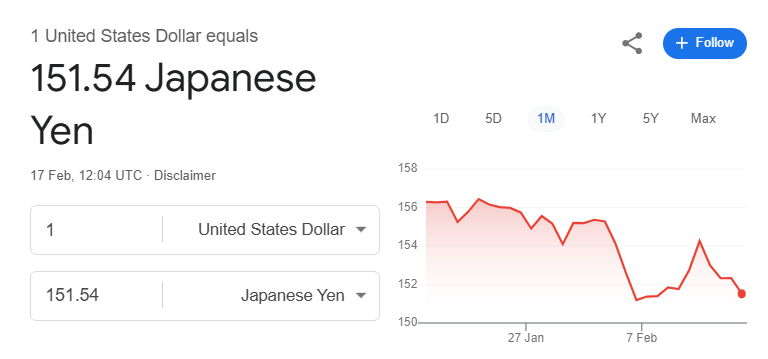Please use a PC Browser to access Register-Tadawul
Betting on Bank of Japan Rate Hike Intensifies, Asset Managers Most Bullish on Yen Since 2021
ProShares Ultra Yen YCL | 19.34 | -0.51% |
Ultrashort Yen Proshares YCS | 50.09 | +0.30% |
Japanese Yen Trust FXY | 58.98 | -0.20% |
As speculation mounts over another rate hike by the Bank of Japan (BOJ), institutional investors' bullish sentiment on the yen has reached its highest level since March 2021.
According to Commodity Futures Trading Commission (CFTC) data, asset managers held the highest net long positions in the yen in nearly four years as of the week ending February 11. Overnight index swaps indicate an over 80% probability of a BOJ rate hike by the end of July, with a hike by the end of September seen as a certainty.
At 15:04 Riyadh time, the yen rose against the dollar to 151.54.

Earlier this month, the BOJ's most hawkish monetary policy committee member, Naoki Tamura, stated that it is necessary to raise rates twice or more before early next year. In December, Japan's nominal wages saw their largest increase in nearly 30 years. Meanwhile, a decline in US January retail sales has reignited bets on a Federal Reserve rate cut, suggesting that the US-Japan interest rate differential may narrow further.
Asset managers are beginning to believe that the BOJ's willingness to hike rates is stronger than initially thought. Shoki Omori, Chief Global Strategist at Mizuho Securities in Tokyo, noted that many expect the terminal rate to be around 1%, but there is growing concern that rate expectations could rise above 1% faster than anticipated.
The yen has been the best-performing G-10 currency against the dollar this year, rebounding after four consecutive years of declines. However, the yen still faces several headwinds, including Japanese retail investors' appetite for overseas stocks and the country's negative real interest rates.
Why it Matters?
In recent years, the BOJ ultra-low interest rates, combined with high rates from central banks in Europe and the US, have fueled rampant carry trades in international financial markets.
This has significantly increased global capital flows and market uncertainty. Last year, the Japanese stock market experienced a record 12% single-day crash. Normalizing Japan's monetary policy is expected to stabilize investor expectations, which is positive news for global financial markets.
However, international investors must also contend with policy uncertainties brought by the new US President Trump. As Kazuo Ueda noted the uncertainty surrounding the scale of tariffs is very high, and once the situation becomes clearer, the central bank will incorporate it into forecasts and reflect it in policy decisions.
Despite the yen showing strength at times since the BOJ began hiking rates last year, its overall weakening trend has persisted. In March 2024, the USD/JPY exchange rate was around 132. By January 2025, it had moved to around 154. This indicates that rate hikes have not fundamentally altered the yen's weak position.
For investors, it is not yet time to breathe a sigh of relief.



